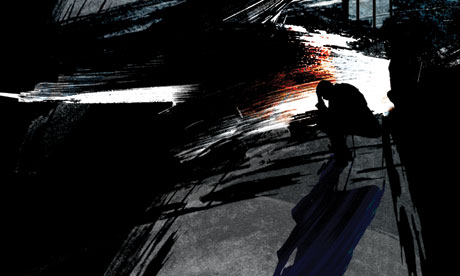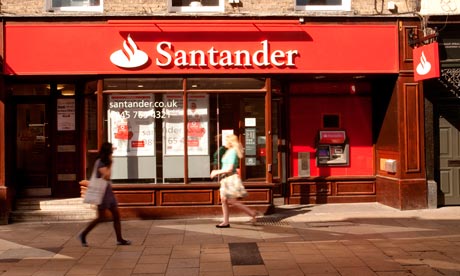Heads
will probably roll for the Libor scandal, but this crisis won't end
until the profession's link with politicians is severed

Banking first refused regulation and now
welcomes it, because only thus can it be protected from the consequences
of its own greed. Illustration: Simon Pemberton
Too big to fail … now too big to jail? There seems no end to the immunity – moral, political, fiscal and possibly legal – claimed by the present masters of the universe, the bankers. In a side-splitting, coffee-spluttering radio interview today, Sir Martin Taylor,
the former chief executive of Barclays, mused that his old board might
consider the best person to "turn the page" on the bank's latest scandal
might be none other than its author and present chief executive, Bob
Diamond. That is presumably despite the bank being fined £290m and pending possible charges of fraud.
Diamond has "taken responsibility" for the division that from 2005 onwards manipulated inter-bank loans so as to disguise the bank's vulnerability in the runup to the 2008 credit crunch. The clear intention was to mislead the market and enrich bank staff with bonuses. Responsibility apparently means Diamond "giving up" a bonus which, surely, he has yet to earn.
A year ago the Barclays chief dazzled the BBC into letting him give a lecture on banking and citizenship, a lecture now sodden with irony. He spoke of the importance of an organisation's culture, of "how people behave when no one is watching", and how "our culture must be one where the interests of customers and clients are at the very heart of every decision we make". Bankers must be good citizens, said Diamond,, or there would be social unrest.
At the time Diamond was demanding his own shareholders pay him not just a salary, but the tax on that salary and then the tax on that taxable benefit. It is not clear who paid the tax in this spiral of greed. Diamond must also have known his colleagues were then being investigated by the Financial Services Authority for irregularities in the bank's trading. Diamond's entire reputation was built on his banking culture, one of bonus-hunting, offshore tax avoidance and killer-takes-all rivalry. For him to give a lecture on ethics invited cliches about Jack the Ripper and door-to-door salesmanship.
The Barclays affair should be a sideshow to our present discontents. The world currently faces the greatest collapse in western statecraft since the second world war. Economists, officials, politicians, even commentators, seem gripped by professional and intellectual rigor mortis, one horribly reminiscent of the 1930s. All experience tells them that a collapse in global demand needs monetary injection, not contraction. Yet they deny it, and bankers lie about it. In Britain we all parrot that £325bn has been "pumped into the economy" by the Bank of England. It has not. The money is nowhere to be seen. It is a device, a headline, a sick joke.
At such times it is comforting to turn from the murky failures of the present to the clear ones of the past. The snoozing Commons Treasury committee is yet again "to call Mr Diamond the account", so it can show off its interrogatory machismo. Lord Myners, formerly of the Guardian, won himself plaudits today by calling Barclays "the most corrosive failure of moral behaviour that I have seen in a major financial institution". But he was a worldly banker himself, and City minister in 2008-9, when the whole house of cards was collapsing amid media reports of "something fishy" in the Libor market. Labour was putty in the hands of the bankers.
From the credit crisis to the present day, the one profession with open access to Downing Street is banking. It lobbies successfully on everything from bailouts to bonuses, non-doms to Tobin taxes, euro regulation to "quantitative easing". When told to lend to small businesses, it refuses. When given money to do so, it buries the money. When ministers plead for lower salaries, it increases them. The government takes over a bank, RBS, and its computers crash. Bankers get ribbed in the press – but so what, when the bonus is in the safe and few are ever called to account, banned from trading, or sent to jail?
Banking gets away with all this because it enjoys the same unaccounted access to power that trade unions enjoyed in the bad old days. It first refused regulation and now welcomes it, because only thus can it be protected from the consequences of its own greed. It preaches the nobility of the markets and then rigs them. We should listen every day to Adam Smith's maxim, that "people of the same trade seldom meet together … but the conversation ends in a conspiracy against the public or in some contrivance to raise prices".
Most running controversies today reflect deep confusion in corporate ethics and accountability. Barclays traders, News of the World reporters, immigration office officials, even drone bombers, turn instinctively to the excuse that they were "just obeying orders". Thus is moral responsibility dispersed and blame passed upwards to the boss, the board, the regulator, the government, ultimately democracy. The great let-out is that "we are all to blame". As the philosopher Reinhold Niebuhr remarked, moral individuals can still constitute an immoral society. Guilt is diffused in a crowd.
Failure of regulation has become a catch-all to sanitise personal and corporate misbehaviour in large organisations. This merely means that, when an outrage has been detected, and a feeding frenzy begins there are howls for heads to roll. Certainly at Barclays public decency, if nothing else, demands some sacrifice. But the real fault lies in bigness, in the ease with which corporations can fall victim to ethical compromise and pretend it is not their fault but the regulator's.
There must surely be a reckoning one day for the loss and agony that the credit crunch has inflicted – and is still inflicting – on millions of innocent victims. But as we seek out the guilty men, we should know that as long as banking retains its stranglehold on policy, the disaster will continue.
Diamond has "taken responsibility" for the division that from 2005 onwards manipulated inter-bank loans so as to disguise the bank's vulnerability in the runup to the 2008 credit crunch. The clear intention was to mislead the market and enrich bank staff with bonuses. Responsibility apparently means Diamond "giving up" a bonus which, surely, he has yet to earn.
A year ago the Barclays chief dazzled the BBC into letting him give a lecture on banking and citizenship, a lecture now sodden with irony. He spoke of the importance of an organisation's culture, of "how people behave when no one is watching", and how "our culture must be one where the interests of customers and clients are at the very heart of every decision we make". Bankers must be good citizens, said Diamond,, or there would be social unrest.
At the time Diamond was demanding his own shareholders pay him not just a salary, but the tax on that salary and then the tax on that taxable benefit. It is not clear who paid the tax in this spiral of greed. Diamond must also have known his colleagues were then being investigated by the Financial Services Authority for irregularities in the bank's trading. Diamond's entire reputation was built on his banking culture, one of bonus-hunting, offshore tax avoidance and killer-takes-all rivalry. For him to give a lecture on ethics invited cliches about Jack the Ripper and door-to-door salesmanship.
The Barclays affair should be a sideshow to our present discontents. The world currently faces the greatest collapse in western statecraft since the second world war. Economists, officials, politicians, even commentators, seem gripped by professional and intellectual rigor mortis, one horribly reminiscent of the 1930s. All experience tells them that a collapse in global demand needs monetary injection, not contraction. Yet they deny it, and bankers lie about it. In Britain we all parrot that £325bn has been "pumped into the economy" by the Bank of England. It has not. The money is nowhere to be seen. It is a device, a headline, a sick joke.
At such times it is comforting to turn from the murky failures of the present to the clear ones of the past. The snoozing Commons Treasury committee is yet again "to call Mr Diamond the account", so it can show off its interrogatory machismo. Lord Myners, formerly of the Guardian, won himself plaudits today by calling Barclays "the most corrosive failure of moral behaviour that I have seen in a major financial institution". But he was a worldly banker himself, and City minister in 2008-9, when the whole house of cards was collapsing amid media reports of "something fishy" in the Libor market. Labour was putty in the hands of the bankers.
From the credit crisis to the present day, the one profession with open access to Downing Street is banking. It lobbies successfully on everything from bailouts to bonuses, non-doms to Tobin taxes, euro regulation to "quantitative easing". When told to lend to small businesses, it refuses. When given money to do so, it buries the money. When ministers plead for lower salaries, it increases them. The government takes over a bank, RBS, and its computers crash. Bankers get ribbed in the press – but so what, when the bonus is in the safe and few are ever called to account, banned from trading, or sent to jail?
Banking gets away with all this because it enjoys the same unaccounted access to power that trade unions enjoyed in the bad old days. It first refused regulation and now welcomes it, because only thus can it be protected from the consequences of its own greed. It preaches the nobility of the markets and then rigs them. We should listen every day to Adam Smith's maxim, that "people of the same trade seldom meet together … but the conversation ends in a conspiracy against the public or in some contrivance to raise prices".
Most running controversies today reflect deep confusion in corporate ethics and accountability. Barclays traders, News of the World reporters, immigration office officials, even drone bombers, turn instinctively to the excuse that they were "just obeying orders". Thus is moral responsibility dispersed and blame passed upwards to the boss, the board, the regulator, the government, ultimately democracy. The great let-out is that "we are all to blame". As the philosopher Reinhold Niebuhr remarked, moral individuals can still constitute an immoral society. Guilt is diffused in a crowd.
Failure of regulation has become a catch-all to sanitise personal and corporate misbehaviour in large organisations. This merely means that, when an outrage has been detected, and a feeding frenzy begins there are howls for heads to roll. Certainly at Barclays public decency, if nothing else, demands some sacrifice. But the real fault lies in bigness, in the ease with which corporations can fall victim to ethical compromise and pretend it is not their fault but the regulator's.
There must surely be a reckoning one day for the loss and agony that the credit crunch has inflicted – and is still inflicting – on millions of innocent victims. But as we seek out the guilty men, we should know that as long as banking retains its stranglehold on policy, the disaster will continue.







 57 Comments
57 Comments